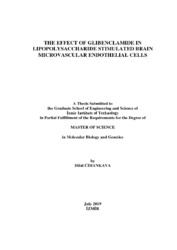Please use this identifier to cite or link to this item:
https://hdl.handle.net/11147/7402Full metadata record
| DC Field | Value | Language |
|---|---|---|
| dc.contributor.advisor | Tosun, Çiğdem | - |
| dc.contributor.author | Cihankaya, Hilal | - |
| dc.date.accessioned | 2019-11-28T13:20:13Z | |
| dc.date.available | 2019-11-28T13:20:13Z | |
| dc.date.issued | 2019-07 | - |
| dc.identifier.citation | Cihankaya, H. (2019). The effect of glibenclamide in lipopolysaccharide stimulated brain microvascular endothelial cells. Unpublished master's thesis, İzmir Institute of Technology, İzmir, Turkey | en_US |
| dc.identifier.uri | https://hdl.handle.net/11147/7402 | - |
| dc.description | Thesis (Master)--Izmir Institute of Technology, Molecular Biology and Genetics, Izmir, 2019 | en_US |
| dc.description | Includes bibliographical references (leaves: 35-44) | en_US |
| dc.description | Text in English; Abstract: Turkish and English | en_US |
| dc.description.abstract | Endothelial cells are essential components of the blood brain barrier (BBB) that regulate the exchange of solutes between the vasculature and the brain parenchyma. The integrity of the BBB is disrupted after central nervous system (CNS) injuries, and it has been associated with the Sur1-Trpm4 channels. Once these channels are opened, Na+ flows into the cells causing edema and cell death. To mimic CNS injuries in vitro, lipopolysaccharide (LPS) was used as an endotoxin to initiate proinflammatory mediators to increase endothelial permeability, and glibenclamide was used as an antagonist of Sur1-Trpm4 channels to reduce the inflammatory response and to maintain the structural integrity of BBB proteins. To demonstrate the role of glibenclamide following LPS stimulation, we determined the cytotoxicity of LPS in bEnd.3 cells by cleaved caspase-3 expression and propidium iodide staining. We also investigated the protective effect of glibenclamide on NF-B translocation, and BBB proteins; collagen IV (COL IV) and zonula occludens 1 (ZO-1) in LPS stimulated bEnd.3 cells. Our results revealed that 1g/ml LPS exposure was sufficient for NF-B nuclear translocation, along with a statistically significant decrease in the expressions of COL IV and ZO-1 proteins, and a significant increase in cell death. We also demonstrated that glibenclamide was able to restore the expressions of COL IV and ZO-1, significantly reduce NF-B translocation, and cell death. Taken together, LPS induction in bEnd.3 cells can be used to investigate endothelial cell dysfunction due to inflammation in stroke and trauma models and glibenclamide can be used as a protective drug to inhibit LPS stimulated inflammatory response, cell death and disruptions in the structures of key BBB proteins. | en_US |
| dc.description.abstract | Endotel hücreleri, beyin parankiması ve vaskülatür arasında maddelerin değişimini düzenleyen kan beyin bariyerinin (BBB) temel bileşenleridir. BBB bütünlüğü, merkezi sinir sistemi (MSS) yaralanmalarının ardından bozulur ve bu Sur1-Trpm4 kanalları ile ilişkilendirilmiştir. Bu kanallar açıldığında, Na+ hücre içine geçerek, ödem ve hücre ölümüne neden olur. Bu çalışmada in vitro MSS yaralanmalarını taklit etmek için bir endotoksin olarak lipopolisakarit (LPS) endotel geçirgenliğini arttıran proinflamatuar mediatörlerin ifadelerini başlatmak için ve glibenklamid bu inflamatuvar tepkileri azaltmak ve BBB'nin yapısal bütünlüğünü korumak için Sur1-Trpm4 kanallarının bir antagonisti olarak kullanıldı. LPS stimülasyonunu takiben, bEnd.3 hücrelerinde glibenklamidin rolünü göstermek için, LPS sitotoksisitesini aktive olmuş kaspaz-3 ekspresyonu ve propidium iyodür boyaması ile belirledik. Ayrıca glibenklamidin LPS ile uyarılmış bEnd.3 hücrelerindeki koruyucu etkisini NF-B translokasyonu ve BBB proteinleri olan kollajen IV (COL IV) ve zonula okludens 1 (ZO-1) üzerinde araştırdık. Sonuçlarımız, 1 g / ml LPS'ye maruz kalmanın NF-B nükleer translokasyonu için yeterli olduğunu, COL IV ve ZO-1 proteinlerinin ifadelerinde istatistiksel olarak anlamlı bir düşüş ve hücre ölümünde anlamlı bir artış olduğunu ortaya koydu. Ayrıca, glibenklamidin COL IV ve ZO-1 ekspresyonlarını geri getirebildiğini, NF-B translokasyonunu ve hücre ölümünü anlamlı olarak azalttığını gösterdik. Birlikte ele alındığında, bEnd.3 hücrelerinde LPS indüksiyonu, inme ve travma modellerinde iltihaplanma nedeniyle endotel hücre disfonksiyonunu araştırmak için kullanılabilir ve glibenklamid, LPS ile uyarılan iltihaplanma tepkilerini, hücre ölümünü ve temel BBB proteinlerinin yapılarındaki bozulmaları engellemek için koruyucu bir ilaç olarak kullanılabilir. | en_US |
| dc.format.extent | xi, 44 leaves | - |
| dc.language.iso | en | en_US |
| dc.publisher | Izmir Institute of Technology | en_US |
| dc.rights | info:eu-repo/semantics/openAccess | en_US |
| dc.subject | Lipopolysaccharide | en_US |
| dc.subject | Glibenclamide | en_US |
| dc.subject | Sur1-Trpm4 channel | en_US |
| dc.subject | Brain microvascular endothelial cells | en_US |
| dc.subject | Blood brain barrier | en_US |
| dc.title | The Effect of Glibenclamide in Lipopolysaccharide Stimulated Brain Microvascular Endothelial Cells | en_US |
| dc.title.alternative | Glibenklamidin Lipopolisakkarit ile Uyarılmış Beyin Mikrovasküler Endotel Hücrelerindeki Etkisi | en_US |
| dc.type | Master Thesis | en_US |
| dc.institutionauthor | Cihankaya, Hilal | - |
| dc.department | Thesis (Master)--İzmir Institute of Technology, Molecular Biology and Genetics | en_US |
| dc.relation.publicationcategory | Tez | en_US |
| dc.identifier.wosquality | N/A | - |
| dc.identifier.scopusquality | N/A | - |
| item.languageiso639-1 | en | - |
| item.grantfulltext | open | - |
| item.fulltext | With Fulltext | - |
| item.openairecristype | http://purl.org/coar/resource_type/c_18cf | - |
| item.openairetype | Master Thesis | - |
| item.cerifentitytype | Publications | - |
| Appears in Collections: | Master Degree / Yüksek Lisans Tezleri | |
Files in This Item:
| File | Description | Size | Format | |
|---|---|---|---|---|
| T001974.pdf | MasterThesis | 1.6 MB | Adobe PDF |  View/Open |
CORE Recommender
Page view(s)
310
checked on Jun 16, 2025
Download(s)
186
checked on Jun 16, 2025
Google ScholarTM
Check
Items in GCRIS Repository are protected by copyright, with all rights reserved, unless otherwise indicated.